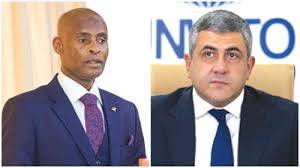Global Tourism at a Crossroads: The Race for UN Tourism’s Next Leader.
The global tourism sector is approaching a pivotal moment: the election of a new Secretary-General for UN Tourism, set to take place this May. This decision carries significant weight, as the chosen leader will steer international tourism policy from 2026 to 2029—an era critical for recovery, sustainability, and renewed growth in a sector still grappling with the aftermath of the COVID-19 pandemic.
As the selection process unfolds, Ghana has officially entered the race, backing Muhammad Adam, a seasoned diplomat and former ambassador to Spain. His candidacy has received high-profile support, including a public endorsement from former President John Mahama. Ghana is actively engaging with member states, rallying support ahead of the Executive Council meeting.
Africa enters the contest with two contenders—Adam from Ghana and Habib Ammar of Tunisia—both facing strong competition from global candidates, including the current Secretary-General, Zurab Pololikashvili of Georgia, who is seeking a third term. In total, six candidates from various regions have declared their intention to lead the organisation, each bringing distinct strengths and visions.
The Candidates at a Glance:
Muhammad Adam (Ghana): Backed by strong diplomatic experience, including roles as ambassador to Spain and consul general in Jeddah, Adam presents himself as a capable and internationally experienced candidate. While his campaign platform is not yet widely publicised, Ghana’s support suggests a focus on promoting Africa’s tourism potential globally.
Shaikha Al Nowais (UAE): Currently serving as Corporate Vice President at Rotana Hotel Management, Al Nowais offers financial and corporate governance expertise. Though her tourism background is less extensive, her business acumen could bring a new strategic and investment-focused approach to UN Tourism.
Habib Ammar (Tunisia): A tourism expert with a key role in Tunisia’s travel industry development, Ammar advocates for sustainable growth, regional collaboration across Africa and the Mediterranean, and increased digital innovation.
Gloria Guevara (Mexico):Former Mexican Secretary of Tourism and ex-president of the WTTC, Guevara is a seasoned tourism policy expert. She aims to revitalise UN Tourism’s credibility and enhance its role in sustainable development and global job creation.
Zurab Pololikashvili (Georgia): Incumbent Secretary-General since 2018, Zurab led the organisation through the pandemic, launching initiatives like the ‘Best Tourism Villages’ and expanding regional offices in Africa and Asia. His third-term vision includes promoting rural and urban tourism, boosting investment, and supporting niche tourism sectors such as gastronomy and sports tourism.
Harry Theoharis (Greece): A former Minister of Tourism, Theoharis proposes expanding UN Tourism’s reach by integrating non-member states like the US, UK, and Australia, while prioritising digital transformation and sustainability.
The Africa Factor
Africa’s dual representation in this election underscores the continent’s growing ambition for a stronger voice in global tourism policy. However, with two candidates—Adam and Ammar—Africa’s vote could become divided, potentially weakening its overall influence. Ghana’s vigorous campaign for Adam reflects its commitment to increasing Africa’s global tourism footprint.
Continuity or Change?
While fresh ideas from new candidates offer promise, many argue that continuity is essential at this juncture. Pololikashvili’s tenure has brought stability, innovation, and strategic growth to UN Tourism. His leadership helped keep the sector afloat during the pandemic, and his proposed initiatives for the coming term align closely with the needs of developing economies.
His administration has modernised the organisation, expanded its regional influence, and maintained a legacy of strong leadership following figures like Robert Lonati, Francesco Frangialli, and Taleb Rifai. These accomplishments bolster the case for his re-election.
What Lies Ahead
As the Executive Council convenes in Madrid from May 29–30, followed by the General Assembly’s final decision in November, the future of global tourism governance hangs in the balance. Whether Ghana’s diplomatic efforts will see an African candidate ascend to the helm for the first time, or whether Zurab secures a historic third term, remains to be seen.
One thing is clear: the outcome of this election will have lasting implications for the global tourism landscape in the years to come.


